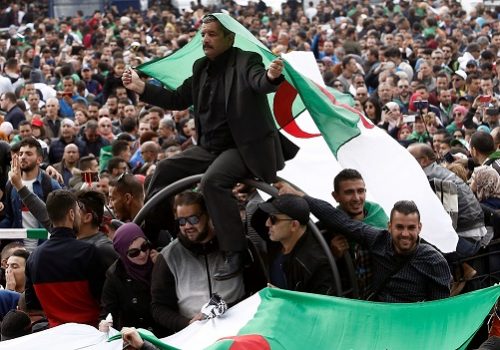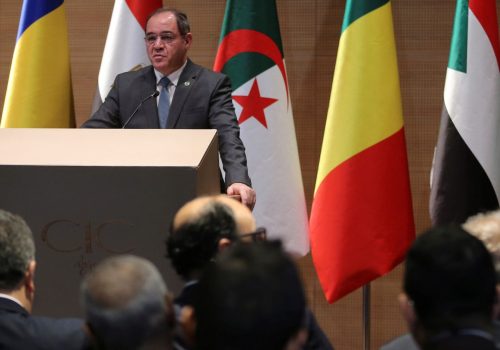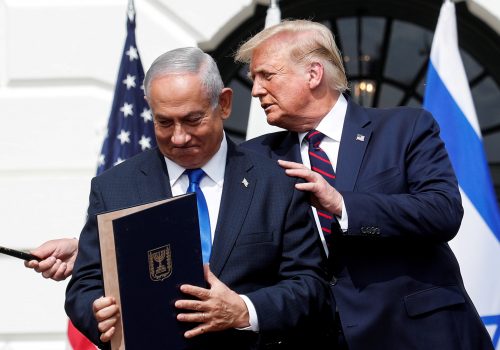Two years on, Algeria’s Hirak is poised for a rebirth
Following the tenth anniversary of the start of the Arab Spring uprisings, Algerians will look back to their own popular protest movement that began two years ago—the Hirak.
Observers unfamiliar with Algeria’s history might presume that, after experiencing more limited protests than its neighbors back in 2011, Algeria was simply slower to reach the boiling point. But this would be a misreading of the country’s peculiar history; Algeria has long followed a different cadence and appears to be on the verge of a new chapter today.
The quest for dignity
Some of the dynamics at work in Algeria in February 2019 were familiar to observers of the Middle East and North Africa. Algerians were frustrated by increasingly brazen crony capitalism, declining public services, widespread unemployment, and an out-of-touch political elite. In office since 1999, President Abdelaziz Bouteflika typified the veterans of Algeria’s liberation war against France who had ruled the country for over five decades—and who had never appeared weaker. Following a stroke in 2013, Bouteflika largely retreated from the public eye, raising doubts about who really ran the country.
During Bouteflika’s rule, Algeria had collected a trillion dollars from its primary exports: oil and gas. Authorities had used this wealth to pad their Swiss bank accounts while covering little more than basic needs for citizens and refusing calls to diversify the economy. They wagered that Algerians, still traumatized from a “Black Decade” of terror that had claimed two hundred thousand lives in the 1990s, had little appetite for revolution. While that may have been true in 2011, by 2019 the ground had shifted. A new generation had come of age, more connected to the outside world, with less trauma from the Black Decade and ambitious dreams for their future.
These youth—along with many of their elders—reacted angrily to the announcement that Bouteflika would seek reelection despite his frail health and the country’s spiraling mismanagement. Days later, on February 22, 2019, Algerians took to the streets in mass protests unseen in a generation. Soon, a regular, weekly rhythm emerged, with university students demonstrating each Tuesday and the wider population each Friday. Taking a lesson from failed revolutions elsewhere, Algerians strictly policed one another to ensure that demonstrations remained peaceful.
Not even Bouteflika’s resignation, in April 2019, could quell the tide since Algerians of all stripes wanted to replace the system, not just its figurehead. They united behind a single slogan: “Get them all out.” But common ground was otherwise elusive. Beleaguered after years of “divide and conquer” methods from the state, opposition parties, civil society, and other institutions that might have helped channel dialogue and forge consensus were unprepared for the task. Prominent figures who angled for leadership were distrusted and shouted down. In the absence of common demands, clear leadership, or a coherent vision for the future, the movement came to be known, fittingly, as simply the Hirak—“the movement.”
“The new Algeria”
After Bouteflika’s resignation, civilian authorities, while nominally in charge, deferred to Algeria’s powerful military, who attempted to smother the Hirak through a mix of appeasement and intimidation. An unprecedented anti-corruption campaign ensnared widely despised businessmen and politicians, including multiple former ministers. The military also sought to divide the Hirak. For example, they jailed protesters for “undermining national unity” if they were spotted carrying a Berber flag. But, to many, the settling of political scores through arbitrary corruption charges alongside the jailing of peaceful protesters were invitations to protest further, not reasons to quit.After multiple delays in the face of continued demonstrations, military leaders, impatient to reinstate order, set presidential elections for December 2019. Numerous popular figures were in jail or ruled ineligible to run, leaving Algerians to choose from a slate of five regime insiders. In an election marred by poor turnout, former housing minister Abdelmadjid Tebboune emerged victorious and sought to turn a page by proclaiming the dawn of “The new Algeria.” Unconvinced, Algerians continued protesting while Tebboune’s new government slowly turned to confront the country’s growing list of crises.
Neither the government nor protesters could have anticipated the arrival of the coronavirus pandemic last spring. Initially, Hirak demonstrations continued for several weeks, before protesters called a halt in late March. The government seized the pandemic as a pretense to reimpose its version of order, shutting the country’s borders, jailing journalists and activists, and blocking access to independent media websites. The task of containing COVID-19, meanwhile, was left to the country’s underfunded and overwhelmed health system.
An empty referendum
Eager to cement its legitimacy and forge a decisive break with the preceding year’s upheaval, Tebboune delivered on his promise of a new constitution. Sadly, the document his government published, just days before a planned November 1 referendum, failed to address protesters’ demands to devolve presidential power, ensure judicial independence, strengthen protections on free expression and press freedom, and more. Instead, authorities had attempted to coopt the movement by praising it in the revised preamble.
Hoping to deny Tebboune the popular mandate he sought, many within the then-dormant Hirak called for Algerians to boycott the referendum. Many heeded their call; official figures showed just 23 percent turnout. Although the constitution passed with two-thirds of the votes, the participation figure represented a record low—and a clear rebuke of the government.
But the results weren’t only embarrassing for the government—they also highlighted the Hirak’s greatest weakness. While its lack of leadership prevented the government from stopping the movement by decapitating it, that same lack of leadership has left it unable to make strategic shifts at critical moments. The referendum was such a moment: given that less than 14 percent of registered voters had voted for the constitution, even a modest effort to mobilize the remaining 86 percent of the electorate to reject it might have succeeded, dealing a far greater symbolic loss to the regime.
A familiar crisis
Tebboune was not in Algeria to witness his narrow victory or sign the constitution into law. On October 28, he had flown to Germany for unspecified health reasons, sparking rampant speculation. When state television broadcast a pre-recorded speech from him, Algerians saw an unsettling parallel: once more, their president sat in a European hospital, unable to lead the country as challenges mounted.
Two days later, the presidency finally confirmed that Tebboune, a 74-year-old chain smoker, had caught the coronavirus, deepening fears of another leadership crisis. For two months, Algerians heard little news on the president’s prognosis even as his absence created mounting problems at home. Algeria was mired in a dual economic and public health crisis that demanded decisions. Yet, under its highly centralized system—a feature of both the previous and new constitutions—the president’s absence effectively froze the workings of the state. Just as Algeria’s broken system was being renewed by a referendum of questionable legitimacy, Tebboune’s absence highlighted that system’s profound fragility.
The leadership vacuum was felt sharply in December 2020, when news landed of Israel and Morocco’s diplomatic normalization, accompanied by American recognition of Morocco’s authority over Western Sahara (Algeria has hosted Sahraoui refugees and supported the former Spanish colony’s right to self-determination for over 40 years). Algerians I spoke with described it as yet another humiliation. Absent from the international scene and without a president to speak for them, Algerians were powerless to shape events even next door. No country in the region reports higher rates of support for the Palestinian cause than Algeria.
To many Algerians, indignities appear to be mounting once more. Amid the rampant spread of COVID-19, Algeria has struggled to organize effective countermeasures, including vaccination. The economy was dangerously over-dependent on hydrocarbons before the pandemic and diversification is hardly imaginable under the current conditions. At the same time, Algerians worry that economic woes will oblige the country to seek bailouts from international financial institutions—a step Algeria took in the 1990s and deeply regretted, making it a political red line today.
Partisans of the Hirak are quick to point out that they voluntarily paused the movement and can restart it at any time. Two years after the Hirak’s eruption, that possibility appears likely. Calls are growing by the day for a return to public protest and a renewed push for fundamental change.
Andrew G. Farrand lived in Algeria from 2013 to 2020, managing youth development programs. He is the translator of Zohra Drif’s Inside the Battle of Algiers (2017) and author of The Algerian Dream (forthcoming in April). He blogs at Ibn Ibn Battuta.
Image: Demonstrators carry national flags as they gather in the town of Kherrata, marking two years since the start of a mass protest movement there demanding political change, Algeria February 16, 2021. REUTERS/Ramzi Boudina


